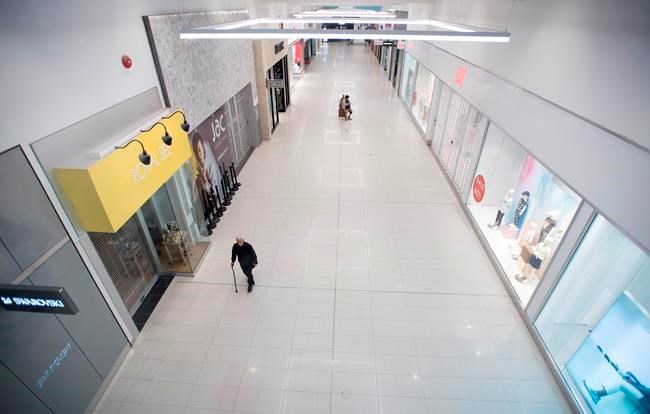VANCOUVER — Shoppers at recently reopened Sleep Country stores looking to test mattresses or pillows will find a disposable protective barrier between them and the product. When Aritzia stores open soon in Vancouver, customers will be able to ask staff for face masks or gloves to wear while they peruse clothing racks.
Several large Canadian retailers are starting to reopen stores as provinces loosen restrictions aimed at controlling the COVID-19 pandemic, but personal protective gear, physical distancing and heightened cleaning measures will make the shopping experience very different.
Aritzia Inc. now considers there to be a "fourth dimension" to its store strategy that previously revolved around product, environment and customer service, said founder and CEO Brian Hill: the health and safety of customers and staff.
The retailer opened two of its stores recently — one in Winnipeg and another in Houston, TX. It's set to open three more in Vancouver over three days, starting Thursday.
Fewer customers will be allowed in each store at a time, with the figure depending on the store's size, said Hill. A staff member with a counter will keep track of those entering and leaving, and other staff will manage lines, if need be. Those staff are likely to be wearing masks or gloves, or both. Aritzia continues to assess what personal protective equipment employees should don.
Store associates will no longer take items from customers and carry them to fitting rooms, though shoppers will be allowed to touch clothes while they browse.
"I'm not suggesting we're going to encourage people, but we're not going to stop people from touching and feeling the product," said Hill, adding people have learned a lot about proper behaviour over the past couple weeks and are likely to act accordingly.
Every second fitting room will be closed and a cleaner will sanitize the space in between customers. Any clothes customers try on but don't purchase staff will be run under a steamer to disinfect.
Roots Canada plans to start opening some stores this Friday. Inside, customers will find more space to roam as stores will have fewer tables and other fixtures. Clothes will be hung, rather than folded and stacked, where possible.
All fitting rooms will be closed, but Roots will start accepting returns five days after stores reopen. Returned items will be tucked away for 72 hours and steamed before reappearing in stores.
"What we're trying to do is also give our staff some time to adapt to the new situation," said interim CEO Meghan Roach.
A lot of the company's customers are used to how the company's clothes fit, which should help them navigate sizing without trying items on, she said, though she noted the company will continue to revisit the fitting room decision and open them if it makes sense to do so.
Sleep Country Canada Holdings Inc. plans to open 165 of its stores throughout this week and next, the company said in a statement released Monday. It declined an interview request.
The mattress retailer believes its stores lend themselves well to physical distancing as they are a "very low traffic destination" since it sells a specialty product. Still, it plans to use floor decals and signs to guide customer movement, and set up hand sanitizer stations, among other measures.
When staff recommend a product, the customer will receive a disposable mattress or pillow protector to test the item, it said.
One calculation consumers must make is determining whether the risk to venture into a store is worth it.
"Even if all of that is in place, I could still get this virus and die from it, and is this sweater really worth that happening?" said Doug Stephens, founder of Retail Prophet, a global consulting firm, as to what customers may be thinking.
In areas where stores have reopened, anecdotal evidence points to lower traffic.
Along the Avenue des Champs-Elysees in Paris, for example, stores experienced a 30 per cent drop in foot traffic, he said, while retailers in China reported 60 per cent to 70 per cent of pre-pandemic levels.
That's partly because consumers remain concerned about their health and the safety of their loved ones, he said, and likely will continue to show restraint until scientists discover a vaccine and most of the population is innoculated.
It doesn't help that nearly every generation feels a financial strain from the outbreak. Retirees likely saw their RRSP balances drop, millennials are living through a second economic crisis during their relatively short careers and generation Z is entering a job market at an unprecedented time, he said.
"Across all consumer segments there's going to be some grave, grave concern about their future economic state."
Stephens believes the coronavirus will have a lasting impact on retail. With COVID-19 set to change many parts of how people live — including education, transportation, office space — it's bound to alter how people shop in the long run.
"It has to if it's just a reflection of how we live," said Stephens, who is currently writing a book on how the coronavirus will change the industry. "Resurrecting retail: the future of business in a post pandemic world" is set to come out in the spring of 2021.
Stores may no longer be an avenue for distributing products, he said, and companies will shift tremendous amounts of capital from physical assets to digital ones.
"There will be far fewer stores, and the bloodletting has already begun."
This report by The Canadian Press was first published May 14, 2020.
Companies in this story: (TSX:ATZ, TSX:ROOT, TSX:ZZZ)
Aleksandra Sagan, The Canadian Press




